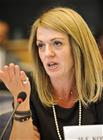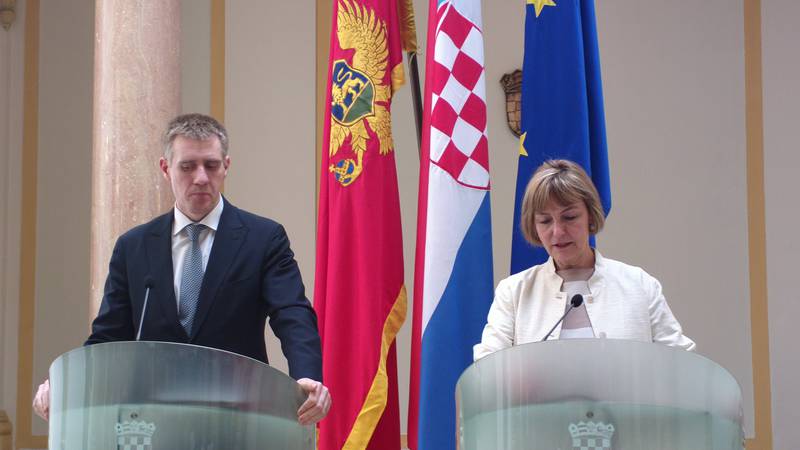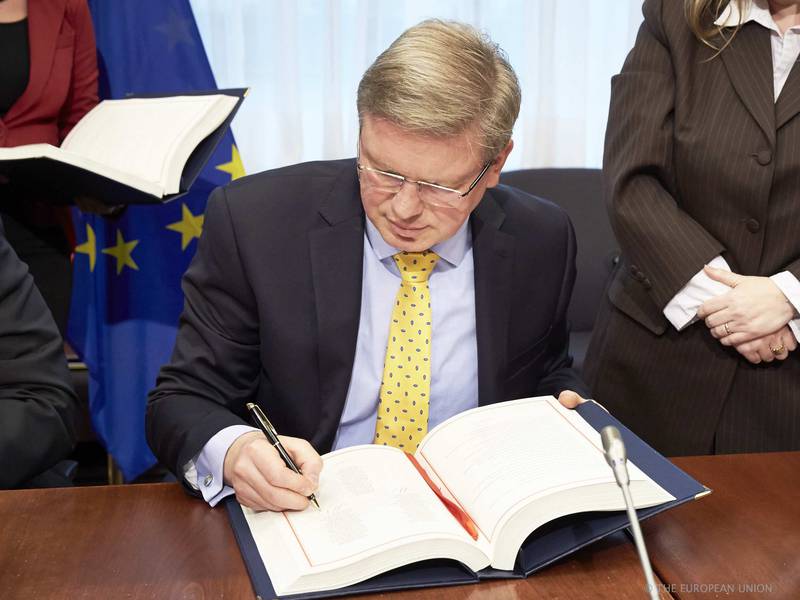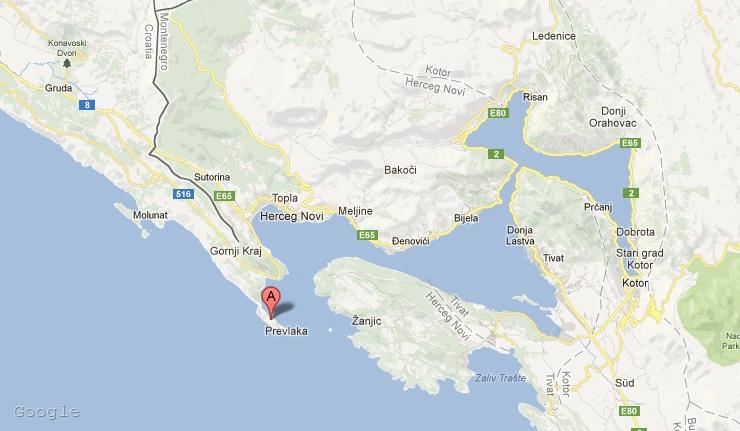How Negro Montenegro Is?
Adelina Marini, January 14, 2013
 Brussels civil servants often get irritated when we, journalists, start making assessments of documents of theirs, especially when it comes to reports on progress toward European membership. Then, most frequently, we resort to assessments like "positive", "good", while national politicians love to say "balanced" and "unbiased". The reason is that seldom ordinary citizens read such documents to be able to get into the, in fact, really very biased and most of all neutral assessments of the European Commission on the progress of the countries who aspire one day to become members of the Union. A problem emerges when either side tries to "translate" the report in a comprehensive way to their audiences - politicians powder it a bit in order to protect their ratings and media simplify it in order to "sell" a really difficult news to digest. That is why very often the problems these reports contain under the "Brussels language" remain unnoticed by the broader public.
Brussels civil servants often get irritated when we, journalists, start making assessments of documents of theirs, especially when it comes to reports on progress toward European membership. Then, most frequently, we resort to assessments like "positive", "good", while national politicians love to say "balanced" and "unbiased". The reason is that seldom ordinary citizens read such documents to be able to get into the, in fact, really very biased and most of all neutral assessments of the European Commission on the progress of the countries who aspire one day to become members of the Union. A problem emerges when either side tries to "translate" the report in a comprehensive way to their audiences - politicians powder it a bit in order to protect their ratings and media simplify it in order to "sell" a really difficult news to digest. That is why very often the problems these reports contain under the "Brussels language" remain unnoticed by the broader public.
This leads to tension within the European Union itself at a later stage when it emerges that a country is insufficiently prepared. The EU burnt itself strongly with Bulgaria and Romania for which it was forced to develop safeguard mechanisms in the very last moment which, alas, do not work, now it is Croatia's turn and there is visible fear on behalf of influential member states the failure with Bulgaria not to be repeated. And where does this fear come from? A passing look over the history of the sovereign crisis in the eurozone answers in a quite satisfactory manner that question, as well as some issues along the Schengen borders. That is why it is important to make a thorough analysis of the problems, to demand these problems to be resolved because the unity in the EU is already at risk.
The big test for Montenegro
The tiny Balkan country of Montenegro is facing a very tough challenge because it is next after Croatia with a visible membership on the horizon. Last year, in the summer, the country got a long-awaited "yes" to start accession negotiations which are ongoing. Alas, the situation in the country does not give too much grounds to hope that this would be the next Croatia, no matter how much we want that as a stimulus for change (not only image change, but an overhaul) of the powder keg, called Balkans.
Montenegro is ruled by a prime minister who has wielded power for the past 20 years and it is difficult to say of him that he is the bearer of change in the country, which desperately needs it. A foreign minster of his is his predecessor Igor Luksic - a young, multi-language-speaking and hopeful, who in fact brought Montenegro to the moment of accession talks. But for the time being the country remains in the hands of its past, of the old type of politics and that is why it will be essential how will Brussels "decipher" its behaviour and deliver it to the European and Montenegrin public (the latter last but not least).
What does Brussels say?
In October, the European Commission, under the journalistic standards, produced a more or less positive but luke-warm report. The language in the document, however, gives sufficient grounds for politicians to present it in a much better light than it actually is. For instance, it contains assessments like: "As regards democracy and rule of law, Montenegro achieved progress in strengthening the legislative and oversight role of the parliament, including on rule of law matters. Implementation of recently adopted legislation on elections has started, and the administrative and expert capacity of the parliament has been reinforced. Transparency has improved and stand-alone committees on European integration and on anti-corruption have been provided for". Words like "improve", "progress", etc. are frequent.
Montenegro is the first of the countries in the enlargement process in the region over  which the Commission will experiment starting the negotiations from the toughest chapters (in the area of justice and rule of law). May be, that is the reason for the mild tone of the report. In this regard, attention deserves the draft resolution being prepared currently by the European Parliament on the progress report. Currently, a process of amendments is taking place on the report of Charles Tannock, a British MEP (European Conservatives and Reformists) and a rapporteur on Montenegro in the Foreign Affairs Committee in the European Parliament. Some of the proposed amendments deserve special attention because they make the overall assessment on Montenegro much clearer.
which the Commission will experiment starting the negotiations from the toughest chapters (in the area of justice and rule of law). May be, that is the reason for the mild tone of the report. In this regard, attention deserves the draft resolution being prepared currently by the European Parliament on the progress report. Currently, a process of amendments is taking place on the report of Charles Tannock, a British MEP (European Conservatives and Reformists) and a rapporteur on Montenegro in the Foreign Affairs Committee in the European Parliament. Some of the proposed amendments deserve special attention because they make the overall assessment on Montenegro much clearer.
In the very beginning of his report, the British MEP points out that Montenegro has achieved "significant" progress on its path towards European membership. But the proposal for amendments of two MEPs from the group of Greens and European Free Alliance, Ulrike Lunacek and Marije Cornelissen, insists to be said that Montenegro has achieved "some" progress. These two MEPs are most active in proposing amendments  to Charles Tannock's report. They insist on changes in how the report refers to the still persistent shortcomings, proposing to underscore specifically the area of fight against organised crime and high-level corruption.
to Charles Tannock's report. They insist on changes in how the report refers to the still persistent shortcomings, proposing to underscore specifically the area of fight against organised crime and high-level corruption.
Obviously responding to the developments in the Balkans in general, but in Montenegro specifically after the elections last autumn, is another proposal for amendments by Maria Eleni Koppa (Socialists&Democrats, Greece), who proposes to the text that outlines that Montenegro is the first country for which the negotiations process is applied with an enhanced focus on fundamental freedoms, justice, fight against corruption and  organised crime, to add democratic governance and rule of law. This amendment is essential because it reflects precisely what the Balkan countries persistently fail in - creating healthy democratic foundations and rule of law.
organised crime, to add democratic governance and rule of law. This amendment is essential because it reflects precisely what the Balkan countries persistently fail in - creating healthy democratic foundations and rule of law.
Ulrike Lunacek and Marije Cornelissen demand a correction in another paragraph in Charles Tannock's report, referring to the elections in Montenegro last year. In the original document an appeal is made to the authorities in the country to improve further the compilation of voter lists, control over financing of campaigns and complaints reviews. The two green MEPs believe, though, that stronger language should be used calling on the Montenegrin authorities to "prevent, with a view to future elections, irregularities concerning the compilation of voter lists, poor transparency regarding oversight of campaign finance and the use of public resources by political parties".
Their proposal for amendments also calls on the authorities in Podgorica to apply "without delay" the relevant recommendations by the ODIHR for fair elections in order to further increase public confidence in the electoral process. That recommendation, by the way, would have probably be available for Bulgaria too, if the country was in a process of EU accession.
 Slovenian MEP Tanja Fajon (Socialists&Democrats) also proposes a drastic change of the text related entirely to corruption. In the British MEP's report it is said that parliament "Regrets that corruption remains common; encourages the government to implement anti-corruption measures, including the new Law on Political Party Financing, in a consistent manner, to build up a track record particularly in terms of investigations and convictions in high-level corruption cases, to further strengthen preventive tools and awareness-raising campaigns as well as to protect citizens reporting on corruption cases; stresses the need to reinforce related administrative capacities and inter-agency cooperation".
Slovenian MEP Tanja Fajon (Socialists&Democrats) also proposes a drastic change of the text related entirely to corruption. In the British MEP's report it is said that parliament "Regrets that corruption remains common; encourages the government to implement anti-corruption measures, including the new Law on Political Party Financing, in a consistent manner, to build up a track record particularly in terms of investigations and convictions in high-level corruption cases, to further strengthen preventive tools and awareness-raising campaigns as well as to protect citizens reporting on corruption cases; stresses the need to reinforce related administrative capacities and inter-agency cooperation".
Tanja Fajon proposes, however, in this text to be pointed out that corruption quite often is perceived with a huge dose of tolerance. Ulrike Lunacek and Marije Cornelissen have remarks to the same text too, offering to write down that the EP calls on concrete results in investigating corruption in high levels, like for instance confiscation of assets obtained through corruption; calls for thorough investigation of privatisation deals that led to liquidation or bad performance of companies. This, by the way, would be an appropriate remark for Bulgaria too. Both MEPs propose changes to the text related to media environment in Montenegro because the original text is quite wishful.
They express concern with the disproportionate threatening statements of high level officials in terms of media activities and the role of media and civil society organisations. They express also "deep concern" with the recent trials against one of the biggest and influential media in the country Vijesti and Dan for the way the two  covered the privatisation of the mobile operator Telekom. Condemned are the attempts to financially weaken independent media, which is a lesson from the situation that unfolded in Hungary and Bulgaria.
covered the privatisation of the mobile operator Telekom. Condemned are the attempts to financially weaken independent media, which is a lesson from the situation that unfolded in Hungary and Bulgaria.
Ulrike Lunacek and Marije Cornelissen propose adding an entirely new paragraph to the text where deep concern is expressed that police investigations of a number of attacks against Montenegrin journalists and media facilities have not led to a single verdict. The Montenegrin authorities are reminded that it is urgent to investigate "successfully" the cases of Dusko Jovanovic, Olivera Lakic and the burning of cars owned by the Vijesti daily. Olivera Lakic is an investigative reporter with Vijesti who in March last year was attacked and severely beaten in front of her home. The editor in chief of Dan, Dusko Jovanovic, was shot dead in 2004 in the street in the Montenegrin capital. Those are not the only cases of violence against journalists in the small Balkan state.
The two MEPs propose a text that affects the creation of an independent committee to prevent conflict of interest, ensuring that its members will not be involved in cases of conflict of interest, organised crime or corruption.
There is a number of proposed amendments related to the economic situation in the country, where unemployment is very high and the flow of investments if fading. What will look like the final resolution the European Parliament will adopt in the first half of 2013 we will see. From the proposed amendments, however, it is clear that Montenegro has problems that deserve serious attention and this time it is important not to pay too much attention only to a group of problems while neglecting others, not less important, such as media environment for instance.
 Igor Luksic, Vesna Pusic | © Council of the EU
Igor Luksic, Vesna Pusic | © Council of the EU Stefan Fule | © Council of the EU
Stefan Fule | © Council of the EU | © Google
| © Google